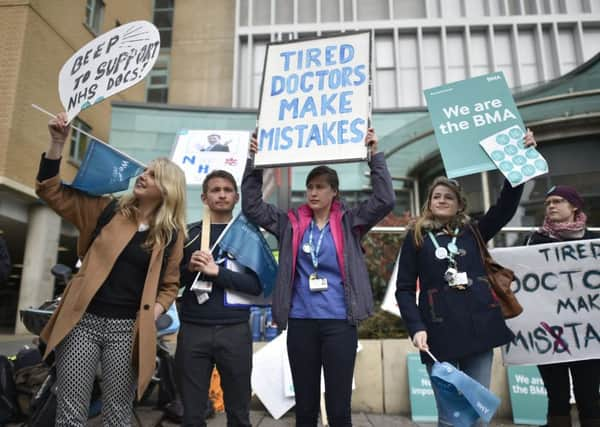Jayne Dowle: No short-term cure for ills of our GP surgeries


At 72, dad is managing myriad conditions including serious heart problems, a rheumatoid disease and glaucoma. From his point of view at least, he can’t fault the health service. It is literally, working round the clock to provide him with the care he needs. As he shuttles between three separate hospitals and his GP’s surgery, He gets frustrated.
In general though, he has nothing but praise and gratitude for the doctors and medical staff who attend to him. In his words, he gets his money’s worth out of the NHS.
Advertisement
Hide AdAdvertisement
Hide AdThe sad irony is that because dad suffers from so many different problems, he’s a priority case. He’s not one of the four million people a year who have to stand and queue if they want to see their doctor in an emergency. Whenever possible, he is seen the same day if he has a problem.
If you’re a normally healthy person with a minor medical issue though, don’t expect to get an appointment at my family doctor’s surgery in anything less than a fortnight. It’s that bad. And I suspect it’s the same in countless practices across the country.
However, lack of emergency care is just one of the serious problems blighting GP practice. New research by The Lancet medical journal has uncovered a shocking litany: GPs working longer and longer hours, a shortage of trained doctors coming into the NHS and a rising and ageing population putting surgeries under ever-increasing strain.
And just when we thought it couldn’t get any more worrying, there is growing evidence that “old-fashioned” diseases such as TB, whooping cough and scarlet fever are back with a vengeance.
Advertisement
Hide AdAdvertisement
Hide AdCompelling research by Public Health England suggests these conditions are taking a concerning hold; instances of scarlet fever alone have risen 136 per cent since 2010. Indeed, my son’s friend, normally a fit and healthy girl of 14, recently fell victim to scarlet fever and spent a month off school. How can the Health Secretary, Jeremy Hunt, say that our health service is working when this is amongst us?
I am just a patient. I can’t deliver a blueprint that will suddenly make the NHS fit for purpose in challenging times. However, I would like to ask Mr Hunt to really take a concentrated look at what is happening every day in our GP surgeries. Changes to funding and working methods have clearly not had the desired effect of making them more responsive and easier to run.
If current evidence is anything to go by, they have had the opposite effect. Dr Richard Vautrey, deputy chairman of the British Medical Association’s GP committee, points out that the Government’s approach to NHS funding in recent years has seen the proportion of resources allocated to general practice drop from 10.5 per cent to 7.5 per cent.
I hope that Jeremy Hunt is listening, not just to patients, but to the countless GPs who are warning him that general practice is nearing “saturation point”. No one doubts the challenge of his job, but his dealings with the medical profession leave much to be desired. Surely it is time for a more collaborative approach? A nation which cannot be cared for when it sick cannot function properly. It’s as simple as that.
Advertisement
Hide AdAdvertisement
Hide AdI’d like the Health Secretary then to accept that the first line of defence should be the doctor’s surgery, not A&E. Many of the problems he faces in our hospitals – including his ongoing battle with junior doctors – are exacerbated by the many pressures which emergency departments are coming under.
I would also like him to be honest about the growing and ageing population, and to develop an understanding of the complex needs of patients. Although we are living longer, like my dad, we are likely to be living with several difficult health issues which require constant management.
Migration, inevitably, has impacted on the services provided by GPs tremendously. This particularly effects the provision of maternity and child health care and advice. It is clear that the UK population is going only one way. Efforts must be made to recruit more medics into general practice. Far too many surgeries are relying on locum cover, which brings its own problems.
Overall, short-term remedies for the longstanding chronic problems in GP practice do no good at all. At the BMA, Dr Vautrey is arguing for, “an urgent, sustained package of support… that prevents GP services collapsing immediately”. That’s a doctor talking. As a patient, I urge the Health Secretary to come up with a long-term care plan which delivers the service we all need.